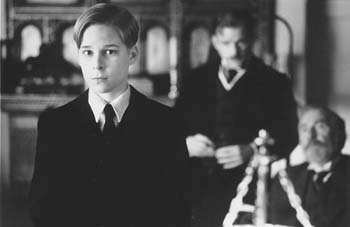![[Metroactive Movies]](/movies/gifs/movies468.gif)
[ Movies Index | Show Times | Metro | Metroactive Central | Archives ]
Father's Day
 Boy Among Men: Guy Edwards finds himself mired in controversy in 'The Winslow Boy.' Too much nuance flattens David Mamet's 'The Winslow Boy' By Michelle Goldberg DAVID MAMET'S VERSION of Terence Rattigan's play The Winslow Boy is subtle, stately, nuanced and quite boring. Forgoing his usual gruffly sinister verbal jousting in favor of a period domestic drama, Mamet tells the story of Arthur Winslow (Nigel Hawthorne), who is willing to bankrupt his family to defend his 13-year-old son against charges of stealing a postal order. Rattigan's play was based on a 1910 case that became a cause célèbre; the lawyer who prosecuted Oscar Wilde was enlisted to defend the accused boy. For a movie like this to work, the director needs to set up some confluence between that era's values and our own--the characters' convictions can't seem annoyingly outmoded. We really have to believe that the son's expulsion from his military school would be such a calamity for the family that all the patriarch's sacrifices make sense. Instead, the father's actions often seem like simple arrogance, especially when he destroys the future of his spunky suffragist daughter (Rebecca Pidgeon) while attempting to redeem his whey-faced son (as played by Guy Edwards, Ronnie Winslow is so insipid that one hopes he's guilty because it would make him far more interesting). Many of the elements in The Winslow Boy are impeccably well done: the rich, burnished visuals, the questions of honor and deceit that ripple beneath the surface of the characters. Pidgeon, Mamet's wife, is especially intriguing. Flinty and deadpan, she plays Catherine Winslow with a wry pride and quiet sarcasm. In many ways, she seems like a slightly subdued Parker Posey. Her father's obsession with the case destroys her engagement, and yet despite her feminism, she doesn't challenge him. There's a palpably electric sexual tension between Catherine and Ronnie's ultraconservative lawyer, and their scenes together are the movie's most compelling. But Mamet's chilly reserve, which so heightened the suspense in such films as The Spanish Prisoner, here just leads to a kind of indifference. Even the public furor that swells around the case is rendered with a kind of surreally offhand distance. The only way into this movie is through an identification with the characters' earnestly bourgeois values. If a viewer doesn't come to the film sharing such ideas, Mamet does nothing to help.
The Winslow Boy (G; 104 min.), directed and written by David Mamet, based on a play by Terrance Rattigan, photographed by Benoît Delhomme and starring Nigel Hawthorne, Rebecca Pidgeon and Guy Edwards, opens Friday at the Camera 3 in San Jose and the Palo Alto Square. [ San Jose | Metroactive Central | Archives ]
|
From the May 20-26, 1999 issue of Metro.
Copyright © Metro Publishing Inc. Maintained by Boulevards New Media.